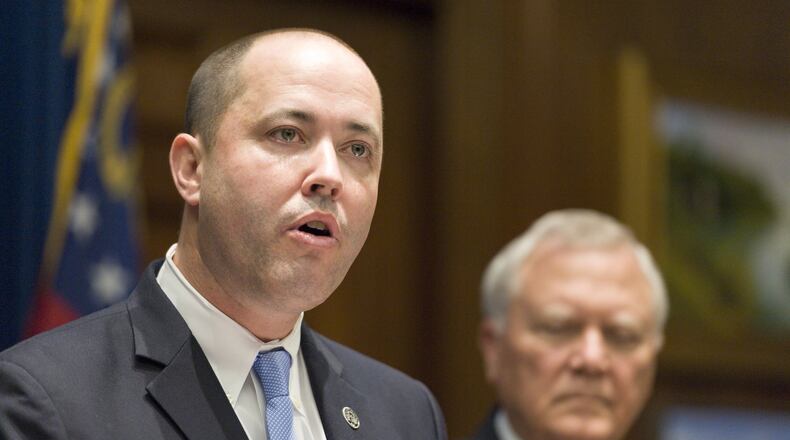Blaming drug companies for opioid overdose deaths, Georgia’s government filed a lawsuit Thursday accusing them of swamping the state with pain-relief products and profiting from users’ addictions.
Attorney General Chris Carr, who brought the suit, said pharmaceutical companies should be held accountable for more than 1,000 opioid overdose deaths in Georgia in 2017.
Georgia joins at least 29 other states that allege drug companies perpetuated a nationwide opioid crisis and encouraged doctors to over-prescribe, leading to patients getting addicted and prescription drugs being sold on the streets.
“The manufacturers and distributors of opioids have fueled this crisis,” Carr said Thursday. “We needed to protect the interests of the people of Georgia, so we filed this lawsuit.”
The lawsuit seeks to recover unspecified amounts of money from the defendants for the cost to the public of treating opioid victims, and it asks a judge to prohibit companies from overly aggressive marketing and importing excessive supplies of the drugs.
Opioid distributors, in their pursuit of profit, failed to flag suspicious orders, which resulted in the drugs being sold for illegitimate and non-medical purposes, according to the lawsuit.
The legal claim also accuses drug companies of understating the addiction risks of opioids while overstating their benefits to relieve pain.
"They were turning a blind eye as long as they were making a profit, knowing that these drugs were flooding the community," said Roderick Edmond, a doctor and a lawyer who is representing Fulton County and other local governments in similar cases against pharmaceutical companies."They knew what they were doing. This was egregious. This was willful and intentional."
Edmond compared the cases against drug companies to the legal cases against tobacco companies, which resulted in a settlement in 1998 in which they agreed to pay at least $206 billion over 25 years.
The statewide lawsuit against pharmaceutical companies, filed in Gwinnett County superior court, comes after about 70 cities and counties in Georgia made similar allegations in their local courts. A federal lawsuit filed by several other states is being litigated in Ohio.
The defendants in the lawsuit include Purdue Pharma, Teva Pharmaceutical Industries, Endo Pharmaceuticals, Par Pharmaceutical, Qualitest Pharmaceuticals, Watson Pharmaceuticals, Actavis Pharma, AmerisourceBergen Drug Corporation, Cardinal Health, McKesson Corporation and J M Smith Corporation.
Purdue Pharma, which makes OxyContin, denied Georgia’s allegations and said it’s working to address the opioid problem. It also pointed out that its actions were governed by the U.S. Food and Drug Administration.
“The state claims Purdue acted improperly by communicating with prescribers about scientific and medical information that FDA has expressly considered and continues to approve,” Purdue Pharma said in a statement Thursday. “We believe it is inappropriate for the state to substitute its judgment for the judgment of the regulatory, scientific and medical experts at FDA.”
McKesson, a distributor of opioids and other medicines, said in a statement Thursday it works to ensure prescription drugs are used only by legitimate patients.
“We maintain — and continuously enhance — strong programs designed to detect and prevent opioid diversion within the pharmaceutical supply chain,” said McKesson’s statement. “We only distribute controlled substances, including opiods, to DEA-registered and state-licensed pharmacies.”
Nationwide, about 47,600 people died from opioid overdoses in 2017, according to the Centers for Disease Control and Prevention.
Neil Campbell, executive director for the Georgia Council on Substance Abuse, said opioids are taking more lives than some wars, and those deaths need to be treated as a national emergency.
“Where’s our march? Where’s our protest? I think it’s happening in the courts,” Campbell said. “The risks around using opiates even for a short period of time were misrepresented.”
The lawsuit calls the proliferation of opioids a “man-made plague” perpetuated by pharmaceutical companies that failed to monitor their products and understated the potential for patients to get hooked.
“Unlike other drug scourges, foreign drug cartels or kingpins did not cause the opioid crisis,” according to the lawsuit. “Instead, this crisis was created in corporate boardrooms at some of the most powerful drug companies in the pharmaceutical industry.”
What it means
Georgia’s lawsuit against drug companies accuses them of playing a key role in the opioid crisis, which resulted in 1,014 overdose deaths in Georgia in 2017, according to the Centers for Disease Control and Prevention. Georgia is the latest state government to take aim at drug manufacturers and distributors, joining at least 29 other states that have sued pharmaceutical companies. If the state wins the lawsuit, it could result in millions of dollars paid to the government to compensate for public health costs related to opioid deaths.
About the Author
Keep Reading
The Latest
Featured



